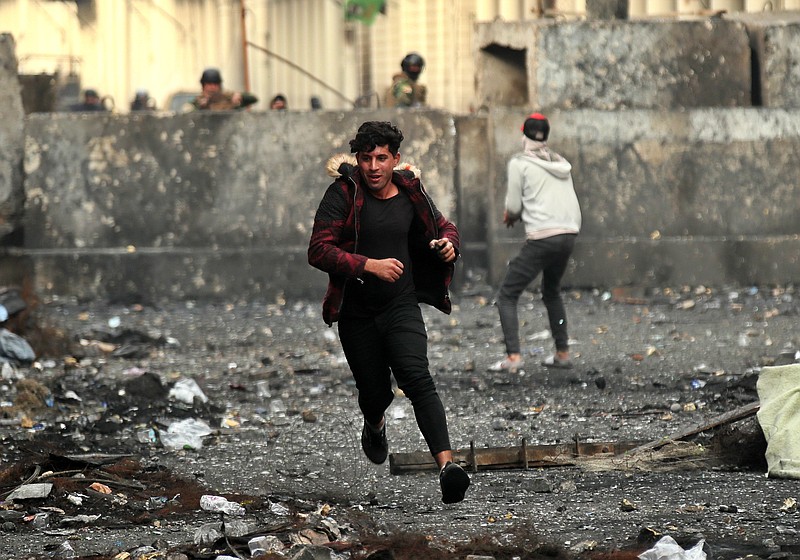BAGHDAD (AP) - Anti-government protesters wielding a blood-drenched flag returned to Baghdad's central plaza Saturday after a night of bloody attacks that left 25 people dead and more than 130 wounded.
Storm clouds gathered over Khilani Square as the protesters surveyed the blackened facade of a parking garage that had served as their de facto command post before unknown assailants torched it Friday night.
Buildings surrounding the square were pockmarked with bullet holes. One demonstrator collected as many as a dozen spent cartridges.
The attack, which took place in darkness moments after the power was cut, marked a major escalation in assaults against protesters that have been taking place in recent weeks.
It was among the deadliest since Oct. 1, when thousands of Iraqis first took to the streets calling for sweeping political reforms and the end of Iran's influence in Iraqi affairs. At least 400 have died at the hands of security forces firing live ammunition and tear gas to disperse the demonstrations.
Friday's attacks also came hours after Washington slapped sanctions on the leader of Asaib al-Haq, a powerful Iran-backed militia accused of being behind deadly sniping attacks on protesters. The U.S. Treasury sanctioned leader Qais al-Khazali, his brother Laith al-Khazali, a commander in the group, and Husain Falih Aziz al-Lami.
Demonstrators feared the attacks would be followed by armed street fighting and more violence that would undermine the peaceful tone of their mass rallies.
"Everyone is terrified," said Noor, a protester who provided only her first name for fear of reprisal. "We don't want this to become a street war. That is why we are trying to stay peaceful. But day after day we find that we are alone."
Anti-government activists blame the attacks on Iran-backed militias, which have staged similar assaults against protester sit-ins in the capital and the country's southern cities. On Thursday, the militias attempted to hold their own demonstration in the square to counter anti-government protesters, many of whom were attacked with knives by unknown assailants. They later withdrew.
Two Iraqi officials, who requested anonymity in line with regulations, said it was widely suspected militiamen were involved in Friday night's attacks.
Members of the Popular Mobilization Units, an official umbrella organization comprising an array of militia groups, have said the attacks during the protests have been aimed at infiltrators of the anti-government movement who were looking to cause disturbances.
Falah Fayadh, chairman of the paramilitary PMUs, the program that oversees an array of Shiite militia groups, directed the PMU forces to stay away from squares occupied by protesters, according to an internal statement issued Saturday and seen by the Associated Press. Those who disobeyed the order would be fired, Fayadh said in the statement.
Protesters said the government's failure to protect them at the height of the hostilities Friday forced them to rely on a militia linked to influential cleric Muqtada al-Sadr, also the leader of the Sairoon bloc, which holds the most seats in Parliament.

